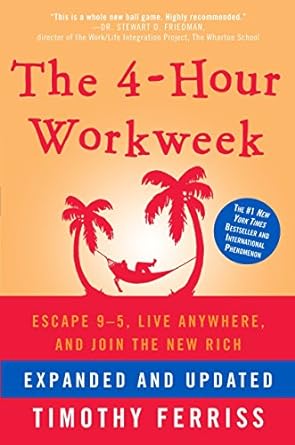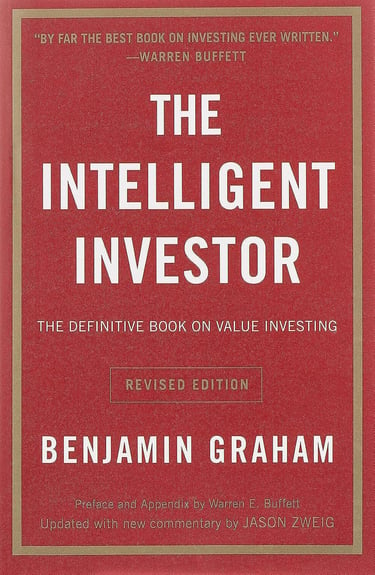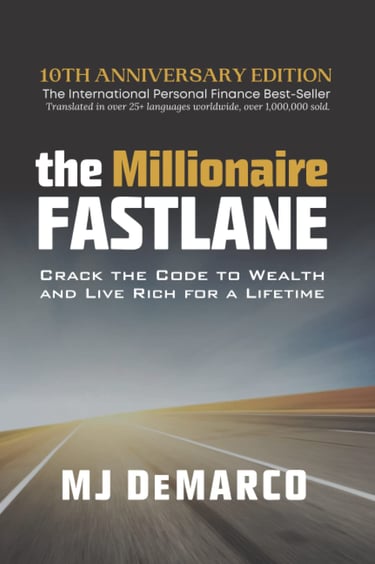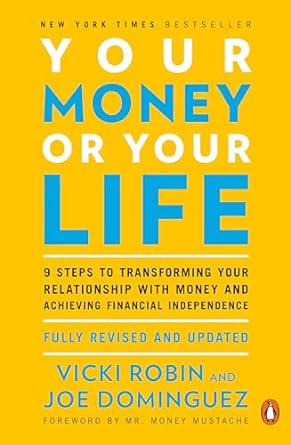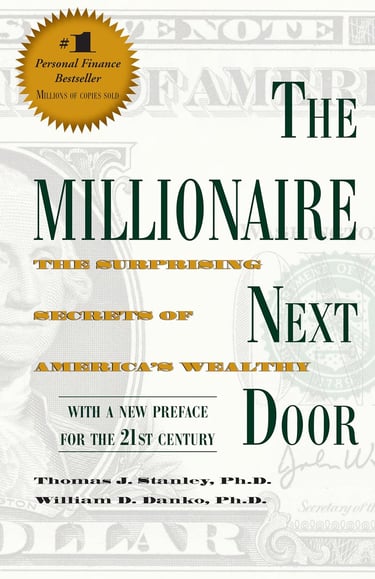5 Must-Read Books for Achieving Financial Freedom: Your Roadmap to Success
5 Books About Achieving Financial Freedom
BOOK REVIEWPERSONAL FINANCES
Jota
4/28/202413 min read


Your support through our carefully selected affiliate links helps us keep the blog thriving — at no extra cost to you.
Hello fellow readers, welcome to the blog! Today I would like to talk about financial freedom and 5 books you should read if achieving it is your goal. This is not about money itself, but the freedom it can provide you to spend time on your purpose. First, what do we mean when we say financial freedom?
Financial freedom refers to the state of being able to live comfortably and pursue one's desired lifestyle without being constrained by financial limitations. It means having enough passive income or assets to cover all living expenses and achieve financial goals without the need to rely on a traditional job or paycheck.
Achieving financial freedom involves a combination of factors, including:
Generating Passive Income: This can be from investments, rental properties, royalties, dividends, or any other source of income that doesn't require active involvement on a daily basis.
Managing Expenses: Keeping expenses in check and living within one's means is crucial for achieving financial freedom. This may involve budgeting, reducing unnecessary spending, and prioritizing savings and investments.
Building Wealth: Accumulating wealth through savings, investments, and asset appreciation is key to achieving financial freedom. This may require long-term planning and disciplined saving and investing habits.
Debt Management: Minimizing and managing debt is essential for achieving financial freedom. Paying off high-interest debt and avoiding unnecessary debt can free up resources for savings and investments.
Financial Independence: Financial freedom often goes hand in hand with financial independence, which means having the ability to make choices and pursue opportunities without being limited by financial constraints.
Ultimately, financial freedom means having the freedom to choose how to spend your time and resources, pursuing your passions and goals without the burden of financial stress or limitations. It's about achieving a sense of security and peace of mind, knowing that you have the resources to live the life you want, on your own terms.
When it comes to achieving financial freedom, knowledge is power. Reading books written by experts in the field can provide valuable guidance and inspiration on the path to financial independence. These books offer insights into various aspects of personal finance, including budgeting, investing, and building wealth.
One of the key benefits of reading books on financial freedom is that they offer a comprehensive and structured approach to managing money. They cover a wide range of topics, from understanding basic financial concepts to advanced investment strategies. These books often provide step-by-step instructions and practical tips that readers can implement in their own lives. By following the advice and strategies laid out in these books, you can develop a solid financial plan and make informed decisions about your money.
Another advantage of reading books on financial freedom is the opportunity to learn from the mistakes and successes of others. Many of these books feature real-life stories and case studies that illustrate the principles and strategies discussed. By studying these examples, you can gain valuable insights into what works and what doesn't when it comes to building wealth and achieving financial independence.
Furthermore, books on financial freedom often provide inspiration and motivation. They showcase the success stories of individuals who have overcome financial challenges and achieved their goals. These stories serve as a reminder that financial freedom is attainable and that anyone can take control of their financial future with the right mindset and strategies. In no particular order:
1. "The 4-Hour Workweek" by Timothy Ferriss
While not explicitly a personal finance book, "The 4-Hour Workweek" offers valuable insights into lifestyle design and creating financial freedom. Timothy Ferriss shares his strategies for escaping the 9-5 grind, automating income streams, and living life on your own terms.
In this book, Ferriss challenges the traditional notion of work and encourages readers to think outside the box when it comes to their careers. He argues that the traditional 40-hour workweek is outdated and inefficient, and instead proposes a more efficient approach to work that allows individuals to achieve more in less time. Ferriss introduces the concept of "lifestyle design," which involves creating a life that is not centered around work, but rather around personal fulfillment and freedom. He provides practical advice on how to streamline tasks, delegate responsibilities, and automate income streams, allowing individuals to work less and enjoy more leisure time.
One of the key principles discussed in the book is the concept of "mini-retirements," which involves taking extended breaks from work to pursue personal interests and passions. Ferriss argues that waiting until retirement to enjoy life is a flawed approach and encourages readers to incorporate regular breaks and sabbaticals into their lives. In addition to providing strategies for escaping the 9-5 grind, Ferriss also offers advice on how to create multiple income streams and achieve financial independence. He shares his own experiences of building successful businesses and provides step-by-step guidance on how to replicate his success.
"The 4-Hour Workweek" is not just a book about personal finance; it is a guide to living life on your own terms. Ferriss challenges conventional wisdom and provides readers with the tools and mindset needed to break free from the constraints of traditional work and create a life of freedom, fulfillment, and financial abundance. Whether you're looking to escape the 9-5 grind, start your own business, or simply gain more control over your time and finances, "The 4-Hour Workweek" offers valuable insights and practical strategies that can help you achieve your goals. It is a must-read for anyone seeking to design a life that is not only financially successful but also personally fulfilling. You can get it on amazon here.
"The 4-Hour Workweek" by Timothy Ferriss
2. "The Millionaire Next Door" by Thomas J. Stanley and William D. Danko
"The Millionaire Next Door" provides a fascinating look into the lives of millionaires in America. Contrary to popular belief, the authors reveal that most millionaires are not flashy spenders but rather frugal individuals who live below their means. This book offers valuable lessons on budgeting, saving, and investing for long-term financial success.
In "The Millionaire Next Door," Stanley and Danko delve into the habits and behaviors of millionaires, uncovering the secrets behind their financial success. The authors conducted extensive research and interviews with affluent individuals to gain insights into their wealth-building strategies. They discovered that these millionaires share common characteristics that set them apart from the average person. One of the key findings of the book is that millionaires prioritise financial independence over displaying their wealth.
They are not driven by material possessions or the need to impress others with their extravagant lifestyles. Instead, they focus on accumulating wealth by living modestly, saving diligently, and investing wisely. Stanley and Danko emphasize the importance of budgeting in achieving financial success. They highlight that millionaires are meticulous in tracking their expenses and have a clear understanding of where their money goes. By living below their means, they are able to save a significant portion of their income and allocate it towards investments that generate wealth over time. Moreover, the authors emphasize the significance of frugality in building wealth. Millionaires are often portrayed as individuals who indulge in luxury and extravagance, but "The Millionaire Next Door" challenges this stereotype. It reveals that many millionaires drive modest cars, live in average neighborhoods, and shop at discount stores. They understand the value of money and prioritise long-term financial security over short-term gratification.
In addition to budgeting and frugality, Stanley and Danko discuss the importance of investing wisely. They highlight that millionaires are not reckless gamblers in the stock market but rather conservative investors who take calculated risks. They diversify their investment portfolios, seek professional advice, and stay informed about market trends. By adopting a disciplined approach to investing, they are able to grow their wealth steadily over time. "The Millionaire Next Door" offers practical advice and strategies for anyone looking to achieve financial success. It challenges conventional notions of wealth and provides a blueprint for building long-lasting prosperity.
By following the principles outlined in the book, readers can learn how to live below their means, save diligently, and invest wisely to secure their financial future. Overall, "The Millionaire Next Door" is a thought-provoking and eye-opening read that dispels common misconceptions about millionaires. It provides valuable insights into the mindset and behaviors of the wealthy, offering practical guidance for individuals seeking financial independence. Whether you are just starting your financial journey or looking to enhance your existing wealth-building strategies, this book is a must-read. You can get it on amazon here.
"The Millionaire Next Door" by Thomas J. Stanley and William D. Danko
3. "The Intelligent Investor" by Benjamin Graham
Written by one of the greatest investment advisors of the 20th century, "The Intelligent Investor" provides timeless wisdom on investing. Benjamin Graham emphasizes the importance of value investing and teaches readers how to analyze stocks and make informed investment decisions.
In "The Intelligent Investor," Graham introduces the concept of value investing, which focuses on buying stocks that are undervalued compared to their intrinsic worth. He argues that by investing in companies with strong fundamentals and buying them at a discount, investors can minimize risk and maximize returns over the long term. Graham's approach to investing is rooted in fundamental analysis, where he encourages readers to thoroughly analyze a company's financial statements, earnings, and growth potential. He stresses the importance of understanding the underlying business and its competitive advantage before making any investment decisions.
Throughout the book, Graham provides practical advice on how to evaluate stocks and build a diversified portfolio. He emphasizes the need for patience and discipline in investing, urging readers to resist the temptation of following market trends or trying to time the market. "The Intelligent Investor" also delves into the psychology of investing, highlighting the importance of emotional control and avoiding irrational behavior. Graham argues that successful investing requires a rational and disciplined mindset, as emotions can often lead to poor decision-making.
Furthermore, Graham addresses the concept of margin of safety, which suggests that investors should only purchase stocks when they are trading at a significant discount to their intrinsic value. This margin of safety acts as a cushion against unforeseen market fluctuations and provides a higher probability of achieving satisfactory returns. In addition to discussing individual stock analysis, Graham also explores the concept of portfolio management. He emphasizes the importance of diversification, spreading investments across different asset classes and industries to reduce risk. Graham suggests that investors should aim for a balanced portfolio that aligns with their risk tolerance and long-term financial goals.
"The Intelligent Investor" is not only a guide to investing but also a lesson in financial literacy. Graham demystifies complex financial concepts and provides readers with the tools and knowledge necessary to navigate the world of investing. Whether you are a novice investor or an experienced professional, this book offers valuable insights and practical advice that can help you become a more intelligent and successful investor. In conclusion, "The Intelligent Investor" by Benjamin Graham is a must-read for anyone interested in the world of investing. Graham's timeless wisdom and practical approach to value investing provide readers with a solid foundation for making informed investment decisions. By emphasizing the importance of fundamental analysis, emotional control, and a margin of safety, Graham equips investors with the tools necessary to navigate the unpredictable world of the stock market.
"The Intelligent Investor" by Benjamin Graham
4. "Your Money or Your Life" by Vicki Robin and Joe Dominguez
"Your Money or Your Life" challenges conventional notions of wealth and encourages readers to reevaluate their relationship with money. The book provides a nine-step program for transforming your relationship with money and achieving financial independence by aligning your spending with your values.
In today's consumer-driven society, it is easy to fall into the trap of equating wealth with material possessions and financial success. However, Vicki Robin and Joe Dominguez argue that true wealth is not measured by the amount of money in your bank account, but by the quality of life that money can provide. They urge readers to question their spending habits and consider whether their purchases truly align with their values and bring them genuine happiness. The nine-step program outlined in "Your Money or Your Life" is designed to help readers break free from the cycle of mindless consumption and find financial freedom.
The first step involves calculating your "real hourly wage," which takes into account not only the money you earn but also the time and energy you spend on work-related activities. This calculation helps you understand the true cost of your purchases in terms of the time it takes to earn the money to pay for them. Once you have a clear understanding of your real hourly wage, the book guides you through steps to track your income and expenses, analyze your spending patterns, and identify areas where you can make changes to align your spending with your values. It emphasizes the importance of distinguishing between needs and wants, and encourages readers to prioritize spending on experiences and relationships rather than material possessions.
One of the key concepts in "Your Money or Your Life" is the idea of financial independence, which is defined as having enough money to meet your basic needs and live a fulfilling life without relying on a job or traditional sources of income. The book provides strategies for reducing expenses, increasing income through alternative sources, and investing in assets that generate passive income. It also emphasizes the importance of saving and investing for the future, so that you can achieve financial security and have the freedom to pursue your passions and interests.
Throughout the book, Robin and Dominguez share personal anecdotes and success stories from individuals who have followed their program and achieved financial independence. These stories serve as inspiration and provide practical examples of how the principles outlined in the book can be applied in real life. In conclusion, "Your Money or Your Life" is a thought-provoking and practical guide to reevaluating your relationship with money and achieving financial independence. By following the nine-step program outlined in the book, readers can gain a deeper understanding of their values and priorities, make conscious choices about how they spend their money, and ultimately live a more fulfilling and financially secure life. You can find it on amazon here.
"Your Money or Your Life" by Vicki Robin and Joe Dominguez
5. "The Millionaire Fastlane" by MJ DeMarco
In a world saturated with personal finance books promising the secrets to wealth and success, "The Millionaire Fastlane" by MJ DeMarco stands out as a bold and unconventional guide to achieving financial independence. DeMarco challenges the traditional notions of wealth-building and offers a roadmap to escape the slow lane of conventional wisdom. In this detailed review, we'll explore the key insights and practical strategies presented in "The Millionaire Fastlane," and examine how they can empower readers to accelerate their journey to financial freedom.
At the heart of "The Millionaire Fastlane" is the concept of the Fastlane mindset—a paradigm shift that emphasizes leveraging entrepreneurship and innovative thinking to create wealth at an accelerated pace. DeMarco distinguishes between the Fastlane approach, which involves creating scalable businesses and pursuing high-impact opportunities, and the slow lane mentality of trading time for money through traditional employment or passive income streams.
One of the book's most compelling arguments is the debunking of the "Get Rich Slow" myth perpetuated by traditional financial advice. DeMarco challenges the notion that wealth accumulation must be a slow and laborious process, advocating instead for a proactive approach to wealth creation that prioritizes speed and efficiency.
Central to DeMarco's philosophy is the distinction between wealth accelerators—activities that have the potential to generate exponential wealth growth—and wealth decelerators—habits and behaviors that impede financial progress. By focusing on wealth accelerators such as entrepreneurship, innovation, and value creation, individuals can bypass the constraints of the slow lane and achieve financial independence at a faster rate.
DeMarco provides practical examples of wealth accelerators, ranging from starting a business to investing in high-growth industries, and contrasts them with common wealth decelerators such as excessive consumerism, debt accumulation, and reliance on linear income streams. By identifying and eliminating wealth decelerators from their lives, readers can redirect their energy and resources towards activities that propel them towards their financial goals.
In "The Millionaire Fastlane," DeMarco outlines a set of commandments—principles and guidelines for achieving financial independence and success. These commandments serve as a roadmap for readers seeking to escape the slow lane and accelerate their wealth-building journey.
Some of the key commandments include:
The Commandment of Control: Emphasizing the importance of taking ownership of one's financial destiny and avoiding reliance on external factors or institutions.
The Commandment of Entry: Advocating for the pursuit of opportunities in industries with low entry barriers and high profit potential, rather than crowded and competitive markets.
The Commandment of Time: Highlighting the significance of leveraging time as a strategic asset and focusing on activities that generate passive income and scalable returns.
By adhering to these commandments and aligning their actions with the principles of the Fastlane mindset, readers can cultivate the habits and behaviors necessary for long-term wealth creation and financial freedom.
Throughout "The Millionaire Fastlane," DeMarco provides readers with a practical roadmap to achieving financial independence and living life on their own terms. This roadmap encompasses various stages of wealth creation, from identifying opportunities and building scalable businesses to diversifying income streams and achieving sustainable growth.
One of the book's strengths lies in its emphasis on actionable strategies and tactics that readers can implement in their own lives. DeMarco shares insights from his own entrepreneurial journey and provides real-world examples of individuals who have successfully escaped the slow lane and achieved financial freedom through the Fastlane approach.
Moreover, DeMarco addresses common misconceptions and pitfalls that aspiring entrepreneurs may encounter along the way, offering practical advice on overcoming challenges and staying focused on their long-term goals. From mindset shifts to practical steps for launching and scaling a business, "The Millionaire Fastlane" equips readers with the tools and knowledge they need to accelerate their wealth-building journey.
"The Millionaire Fastlane" by MJ DeMarco is a thought-provoking and practical guide to achieving financial independence and living life on your own terms. By challenging conventional wisdom and advocating for a proactive approach to wealth creation, DeMarco empowers readers to break free from the constraints of the slow lane and pursue opportunities for exponential growth and success.
Through a combination of mindset shifts, actionable strategies, and real-world examples, "The Millionaire Fastlane" provides readers with a roadmap to escape the rat race and achieve financial freedom at an accelerated pace. Whether you're an aspiring entrepreneur or someone seeking to take control of your financial destiny, this book offers valuable insights and inspiration to help you achieve your goals and live a life of abundance and fulfillment.
"The Millionaire Fastlane" by MJ DeMarco
Whether it's learning about investment strategies, mastering personal finance principles, or gaining insights from successful entrepreneurs, the knowledge gained from books and other educational resources is invaluable. By prioritizing learning, embracing curiosity, and seeking out knowledge from a variety of sources, you can equip yourself with the tools and insights needed to navigate the complexities of the financial world and realize your dreams of financial independence. There are many roads to achieve your goals in financial freedom but self-discipline, consistency and knowledge are key to making any improvements. Ultimately, getting your finances in order is essential in unleashing you to pursue your purpose and live the life you dream about. See you all soon!

